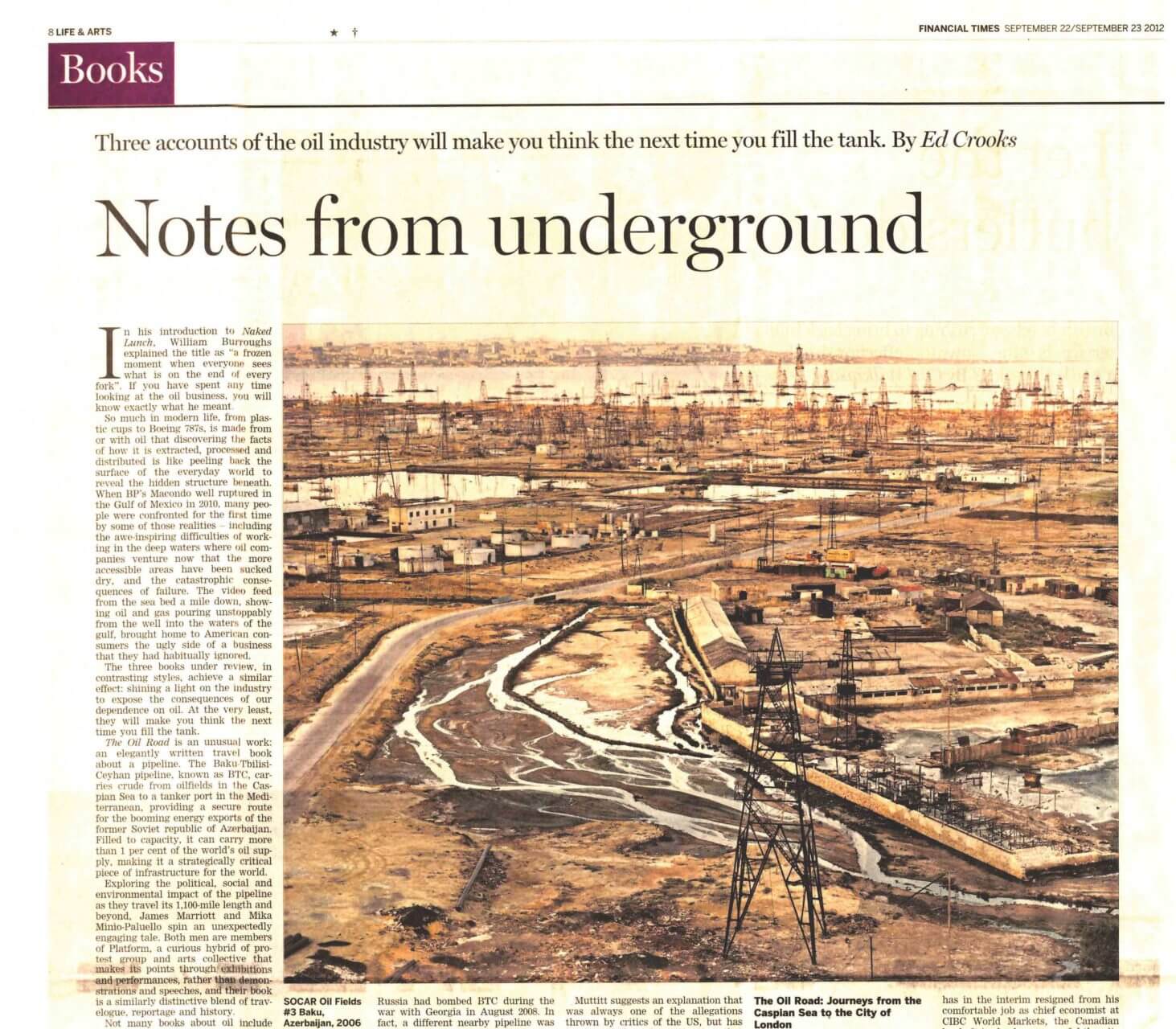This weekend the Financial Times featured a great essay by Ed Crooks on some accounts of the oil industry. We were thrilled that Crooks led with Fuel on the Fire and Platform’s new book The Oil Road, as well as Jeff Rubin’s The Big Flatline.
Fuel on the Fire, published in 2011, reveals the oil politics behind the Iraq occupation. It’s based on research Greg Muttitt did as part of Platform in both Iraq and internationally to publicise the secret plans for Iraq oil. As Crooks writes, the book is:
A painstaking piece of investigative reporting with 48 pages of footnotes, based on documents released under freedom of information legislation and interviews with Iraqis, it gives the best account yet of a hitherto under-reported story.
The Oil Road was published just last week. On the 4 October we’ll be at the London Review Bookshop talking about the people and organisations that ensure crude keeps moving from the Caspian sea into the city of London.
Here’s a short extract from the Financial Times article:
 “The Oil Road is an unusual work: an elegantly written travel book about a pipeline. The Baku-Tbilisi-Ceyhan pipeline, known as BTC, carries crude from oilfields in the Caspian Sea to a tanker port in the Mediterranean, providing a secure route for the booming energy exports of the former Soviet republic of Azerbaijan. Filled to capacity, it can carry more than 1 per cent of the world’s oil supply, making it a strategically critical piece of infrastructure for the world.
“The Oil Road is an unusual work: an elegantly written travel book about a pipeline. The Baku-Tbilisi-Ceyhan pipeline, known as BTC, carries crude from oilfields in the Caspian Sea to a tanker port in the Mediterranean, providing a secure route for the booming energy exports of the former Soviet republic of Azerbaijan. Filled to capacity, it can carry more than 1 per cent of the world’s oil supply, making it a strategically critical piece of infrastructure for the world.
Exploring the political, social and environmental impact of the pipeline as they travel its 1,100-mile length and beyond, James Marriott and Mika Minio-Paluello spin an unexpectedly engaging tale. Both men are members of Platform, a curious hybrid of protest group and arts collective that makes its points through exhibitions and performances, rather than demonstrations and speeches, and their book is a similarly distinctive blend of travelogue, reportage and history.
Not many books about oil include references to Rainer Maria Rilke and Filippo Marinetti, or cite Robert Fagles’ translation of The Odyssey in their bibliographies alongside the 2008 annual report of the state oil fund of Azerbaijan. Marriott and Minio-Paluello have points to make about the corrosive effect of oil money, and about the damage done by oil to the environment. Getting BTC built was an important diplomatic objective for the US and Europe, as well as a commercial priority for BP, which owns much of the oil that flows through it. As the authors point out, the interests of people living along the route were never the principal focus.
But the book is more a series of reflections than a polemic or manifesto. Rather than John Pilger or Naomi Klein, the presiding spirit is that of Iain Sinclair, who uses rambling excursions in and around London to uncover hidden aspects of the city’s past and present.
Following the route taken by the oil, from the offshore platforms in the Azeri-Chirag-Gunashli oilfield in the Caspian to refineries in Germany, Marriott and Minio-Paluello intersperse the story of their journey with historical anecdotes, often showing how oil has shaped the regions they pass through from Baku to Bavaria. It is an illuminating technique, pointing up how much continuity there is in the nexus of money, power and oil.
Not that the pair are slouches as reporters. They deliver some sharp observations about the suppression of free speech in Azerbaijan and the danger of leaks, and uncover a genuine scoop in pinning down stories that Russia had bombed BTC during the war with Georgia in August 2008. In fact, a different nearby pipeline was attacked, apparently deliberately, but was not hit.”